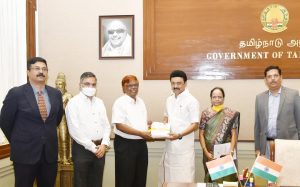Tamil Nadu ordinance based on Justice Chandru panel report, and inputs from stakeholders, legal experts, research findings.

The Tamil Nadu ordinance has prohibited online gambling, whereas online games would be regulated. (Creative Commons)
Tamil Nadu recently promulgated an ordinance to prohibit online gambling and to regulate online games in the state.
This came after the state Cabinet on 26 September approved the draft ordinance based on the report submitted by the retired Justice K Chandru-led panel — which was constituted to study various aspects of these games and their impact — and inputs from other stakeholders. The date on which the law will come into effect will be notified shortly, officials said.
Meanwhile, the content of the ordinance became public on 7 October, a day after a 22-year-old engineering student died by suicide near Manapparai in Trichy district after he reportedly lost a few thousand rupees in online rummy.
It may be noted that the Madras High Court in August 2021 had struck down a similar law — Part II of the Tamil Nadu Gaming and Police Laws (Amendment) Act, which was enacted to ban playing games such as rummy and poker in cyberspace with stakes, when the previous AIADMK government was in power.
One of the main reasons for promulgating the ordinance is that, in the recent years, online gambling addiction has led to many persons incurring unsustainable debts, which in several cases led to deaths by suicide. The financial distress caused by such debt has also ruined many families. These issues affected the public order, the government said.
In its explanatory statement on the ordinance, the government said that it decided to prohibit online gambling and regulate online games after carefully considering the report submitted by the retired justice Chandru-led committee, findings of a survey among school teachers on the effects of online games on government school students, research studies on the subject, views of the stakeholders and the general public, and after having examined the various legislative options at its disposal.

Retired Justice K Chandru-led panel submitting its report to Chief Minister MK Stalin on online gambling and its impact. (Supplied)
For example, it said that, in a survey conducted among more than two lakh teachers from the School Education Department to study the effects of online games on students, more than 74 percent responded that concentration of students, intelligence quotient, writing skills and creativity have been impacted by the online games.
More than 77 percent of them said they noticed increase in anger among students and 72 percent said that they observed indiscipline.
When views of the general public were sought, 10,708 out of the 10,735 (99 percent) mails received by the government urged a total ban on online games.
The government also pointed out that it had a long-standing policy of prohibiting in-person gambling and betting as reflected in the Tamil Nadu Gaming Act, 1930, and the Chennai City Police Act, 1888.
“The spread of online gaming threatens to undo the efforts of the state,” the statement read.
Listing more reasons for the ordinance, the statement said: “Firstly, gambling by means of electronic communication is available at all hours, from any place, and to any person who is able to access a device capable of remote communication. Secondly, online gambling often involves players competing with non-human/virtual participants, which are controlled by a variety of computer algorithms. The degree of chance or skill involved in such remote games cannot be assessed independent of the relevant algorithm or programme.”
“Lastly, remote gambling often takes place by means of virtual currencies and tokens, bypassing the state’s financial surveillance.”
Under the Tamil Nadu Prohibition of Online Gambling and Regulation of Online Games Ordinance, 2022, online gambling has been prohibited.
The term “online gambling” is defined as “online wagering or betting and includes playing of any online game of chance for money or other stakes, in any manner”.
Likewise, playing of online games of chance — specified in the schedule of the ordinance as rummy and poker — with money or other stakes — anything recognised as equivalent to money, including virtual credits, virtual tokens, virtual coins, etc, — is also prohibited.

Online rummy. (Creative Commons)
Online games of chance, according to the ordinance, are “games which involve both an element of chance and an element of skill and the element of chance dominates over the element of skill; or involves an element of chance that can be eliminated only by superlative skill; or is a game that is presented as involving an element of chance; or involves cards, dice, wheel or other such device which works on random or event generator”.
It also prohibits online games providers from providing any of the above-mentioned services in contravention of the regulations.
Further, a ban has been imposed on advertisements in any media, including electronic means of communication, in Tamil Nadu that promotes or induces any person to indulge in the prohibited activities under the ordinance.
Under the ordinance, banks, financial institutions and payment gateway providers cannot engage in any transaction or authorisation of funds towards payment for the banned games.
As per the ordinance, any person indulging in online gambling or any game of chance such as rummy and poker, with money or other stakes, or plays any other game in contravention of the regulations, shall be punished with imprisonment for a term which may extend up to three months, or with fine which may extend up to ₹5,000, or with both.
For those “making or causing to make” advertisements related to such games, the punishment is imprisonment for a term which may extend up to one year, or a fine which may extend up to ₹5 lakh, or both.
Persons providing the prohibited services would face up to three years of imprisonment, or fine extending up to ₹10 lakh, or both.
When an offence has been committed by a company, every person who, at the time the offence was committed, was in-charge and responsible for the conduct of the business of the company shall be deemed to be guilty and liable to be punished.
The ordinance also entails the setting up of the Tamil Nadu Gaming Authority to regulate online games.
The authority will issue certificates of registration to local online game providers; identify online games of chance and recommend to the government for inclusion in the schedule; oversee the functioning of the online game providers in the state; collect and maintain data with regard to the activities of the online game providers; request government to take appropriate action as per the Information Technology Act, 2000, whenever deemed necessary; resolve grievances or complaints received against any online game provider; advise the government on matters regarding online gaming, among others.
The chairperson of the authority would be an officer who has retired from a post not below the rank of chief secretary to the government. Other members include: An officer who has retired from a post not below the rank of inspector general of police; an expert in the field of information and technology; an eminent psychologist; and an expert in the field of online gaming.
As far as the powers to make regulations are concerned, the “authority may, with previous approval by the government, make regulations consistent with the provisions of the ordinance”, and “such regulations may provide for time limit, monetary limit, age restriction or such other restriction in regard to playing online games, and procedure to regulate its own functions”.
The authority, or an officer empowered by it, can also take any steps necessary to obtain information from online games providers or online game players.
According to the ordinance, local online games provider means an online game provider whose central management and control of service is in Tamil Nadu, and whose service is available for access by the customers is hosted in the state.
Once the ordinance comes into effect, no local online games provider should provide any service for the conduct of any online game except in accordance with a certificate of registration from the Tamil Nadu Gaming Authority.
The registration certificate, which would be valid for a period of three years, will be issued on the condition that the “online games provider should not provide any online gambling service or allow playing of any online game of chance such as rummy and poker with money or other stakes” and the “the online game providers should neither allow nor cause to be allowed to play any online game in contravention of the regulations”.
If the certificate of registration has been obtained fraudulently, and if the holder of the certificate has contravened any provisions of the law, then the authority can, after providing an opportunity to show cause, revoke the certificate.
However, if the authority is of the prima facie view that the registration certificate must be suspended, it can do so for reasons to be recorded in writing, any time before the certificate is revoked.
Under the ordinance, an appellate authority would be established comprising a chairperson and not more than two members. The chairperson would be a retired judge of the high court or a person who is qualified to be a judge of a high court.
The appellate authority can be approached by any aggrieved person in case the gaming authority revokes the certificate of registration. The appeal should be decided upon as expeditiously as possible, but in any case, not later than one month from the date of receipt of the appeal.
Non-local online game providers are game providers whose central management and control of the service is not in Tamil Nadu and whose service is not hosted in the state.
A non-local online game provider would be deemed to have complied with the regulations if it provides geo-blocking — restricting users from accessing online services based on geographical location — and observes due diligence.
By “due diligence”, the ordinance meant: Inform prospective customers that Tamil Nadu prohibits online gambling and playing of such games by those who are physically present in the state; require the customers to enter into contracts with the express condition that they do not use the service if they are physically present in Tamil Nadu; require the customers to provide essential personal details to establish that they are not physically present in the state.
If the non-local game providers are found to be flouting the norms, the authority will recommend to the state government to request the Centre to exercise its powers under Section 69-A of the Information Technology Act, 2000, to block access to persons in Tamil Nadu to the service extended by the concerned games provider.

Apr 26, 2024

Apr 25, 2024

Apr 24, 2024

Apr 19, 2024

Apr 19, 2024

Apr 19, 2024